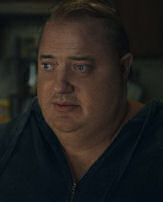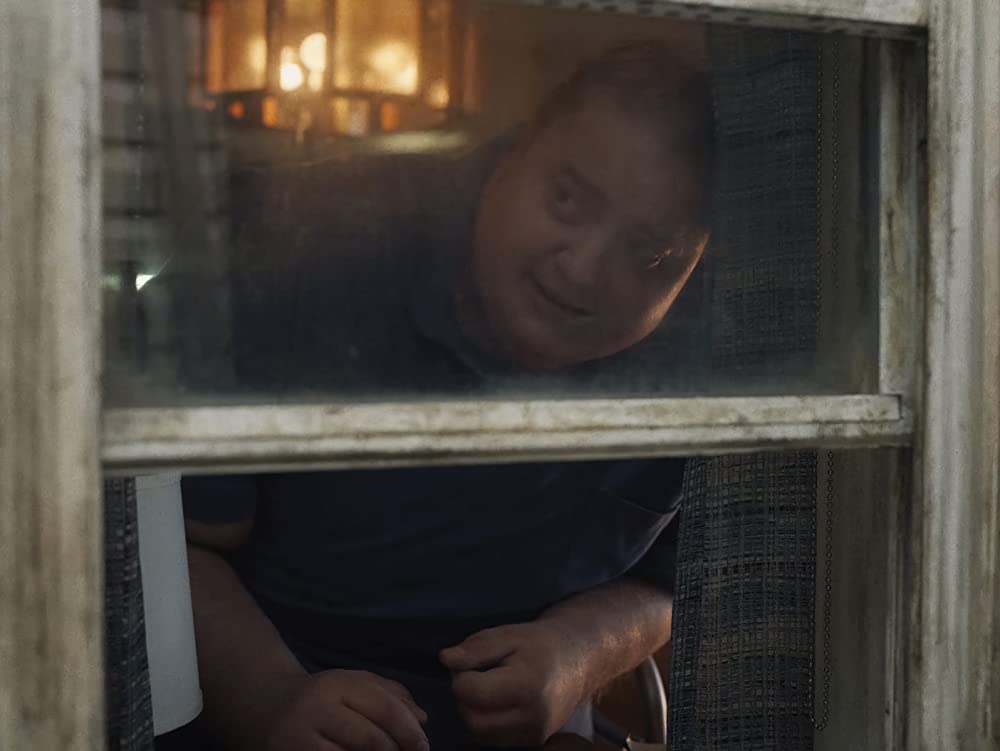 In 2012, Darren Aronofsky (“Mother!”), attended a performance of “The Whale,” a play by Samuel Hunter. A decade later, he directed a movie version with Hunter as screenwriter and Brendan Fraser (“Gods and Monsters”) starring as the protagonist, Charlie.
In 2012, Darren Aronofsky (“Mother!”), attended a performance of “The Whale,” a play by Samuel Hunter. A decade later, he directed a movie version with Hunter as screenwriter and Brendan Fraser (“Gods and Monsters”) starring as the protagonist, Charlie.
Charlie is a recluse. He teaches a writing class online, invisible to his students. Once he was married, with a daughter, but eight years ago he deserted them to start a homosexual relationship with one of his adult students. That young man, Alan, who could not reconcile his homosexuality with his conserv-ative religious upbringing, eventually committed suicide. Since then, Charlie has been alone.
People in pain have a variety of coping strategies. Some become angrily violent; some take to drink and alcoholism; others use drugs, especially opioids; and some, like Charlie, become addicted to food. At the time of the story, Charlie weighs 600 pounds and cannot move about his second-floor apartment without using a walker and later a wheelchair.
Charlie’s weight has become deadly, with skyrocketing blood pressure, and heart seizures whenever he exerts himself. He does have one friend, Liz (Hong Chau — “The Menu”), a nurse. She is the sister of his deceased lover, and cares for him. She knows he is dying, but honors his refusal to go to the hospital for treatment.
Then, as his end nears, a young man, Thomas (Ty Simpkins — “Where’s Rose?”), proselytizing for a Christian sect – the same one Alan belonged to – shows up at Charlie’s door and a sort of relationship is established. Almost at the same time, Charlie’s long estranged daughter, Ellie (Sadie Sink — “Stranger Things”), who was eight when he left her, also shows up. Now 16, she is suffering, too, and her coping mechanism is bitterness and cruelty. From that point on, the movie revolves around the interaction of these four as Charlie’s health worsens.
This film has proven very controversial. It has been called a monster movie. It has been attacked for fat-shaming, insensitivity and “trauma porn” — whatever that is. In my opinion, it is the antithesis of these accusations. This is an incredibly human screenplay and a performance which ranks among the best of American cinematic drama.
Brendan Fraser, who has had plenty of lightweight parts (“George of the Jungle,” “Monkeybone,” the “Mummy” movies) in his three decades in Hollywood, displays an incredible depth of characterization, perhaps informed by his own personal struggles during the last decade. In addition, Hong Chau and Sadie Sink put in impressive performances.
There is a claustrophobic feel to the film, and some have complained about this, pointing to its origin as a stage play. True enough. However, that diminished range of space and movement is exactly what Charlie suffers from. He can barely move about the living room/kitchen that is the primary set. And movement outside is impossible from his second-floor walk-up.
Add to that the sense of shame at his appearance that prevents him from appearing on camera to his students or even answering the door for the pizza delivery man. A life of circumscription is exactly what he lives and what we need to feel in order to appreciate his suffering. Further, the intentional dim lighting and muted colors enhance this half-life in which he is trapped.
One core element of the film is an essay on Melville’s “Moby Dick.” Superficially, this could be taken as a reference to the size of the protagonist. However, as is clearly evident in the partial reading of the essay written by Ellie, and just as it was in that immortal American novel, the whale is a metaphor for something else: the struggle of the human soul. Writer Hunter is telling us to look beyond the illness (uncontrollable anger, addiction, homelessness, etc.) to see the tormented human beings struggling to conquer their demons and in desperate need of our caring understanding.
As Charlie might have said: “This movie is amazing!”

Runtime: One hour, 57 minutes
Availability: Theaters, HBO Max
. . .
Join us on Facebook at
http://www.facebook.com/itsjustmovies!